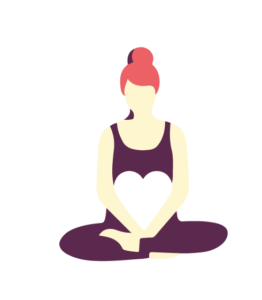of someone with (breast) cancer

Stress is part of everyday life and, for many carers, stress can be a major factor affecting their health.
Stress is caused by the many demands made on our time and energy, and the expectations we have of ourselves. Not all stress is negative – stress can alert you to potential dangers and can also spur you on to achieve a goal or complete a task. However, sometimes the balance tips too far and the pressure becomes so intense or so persistent that you may feel unable to cope.
Stress can make it hard to handle the demands of caring. You can become more and more exhausted, tense and irritable, putting a strain on relationships. This can make you feel you are losing control over your life and that there is no way of regaining this control.
The symptoms of stress can be both mental and physical, and can vary from person to person:
 Mental symptoms can include anxiety, anger, depression, lack of appetite, sleeplessness, crying often, tiredness and difficulty concentrating.
Mental symptoms can include anxiety, anger, depression, lack of appetite, sleeplessness, crying often, tiredness and difficulty concentrating.
 Physical symptoms can include chest pains, cramps, muscle spasms, dizziness, restlessness, nervous twitches and breathlessness.
Physical symptoms can include chest pains, cramps, muscle spasms, dizziness, restlessness, nervous twitches and breathlessness.
The first step in dealing with stress is to recognise it is happening. You may have so little time to yourself that you don’t realise it at first. When you do start noticing the symptoms of stress (see below), do not struggle on, hoping it will go away. Everyone reacts to stress differently, and each body sends out its own different red flags. The sooner you deal with the problem, the better, and just talking about how you feel can help you find a way to deal with it.
The first step in dealing
with stress is to recognise
that it is happening
Over the long term, some of these stress symptoms may affect your health and put you at risk of high blood pressure, which can lead to heart attacks and stroke.
There are steps you can take to help tackle depression and move on. What works will be different for each individual but here are some ideas:
Don’t keep it to yourself – If you are depressed, try telling someone about it. It often helps to talk things over with someone you trust rather than keeping it all bottled up.

Meet with other people who have experience depression and hear how they coped – Self-help groups can often provide advice and training on relaxation and information on complementary therapies.

Do some exercise – Get out of doors, even if only for a walk. This will not only help keep you fit but may also help you sleep better. Try to keep active – whether that is housework, ‘Do It Yourself’ or your normal routine. All of these can help you take your mind off thoughts that may make you more depressed.

Keep hopeful – Remind yourself that you are suffering from an experience that many other people have gone through. You will eventually come out of it, although you may find it hard to believe at the time.

Look after yourself – Eat a healthy diet and steer clear of alcohol as this can make your depression worse. It’s also important to get enough sleep.
If you feel that you may be depressed, see your General Practitioner (GP). It is important to see your GP sooner rather than later, so you can start having treatment and start feeling like your old self again.
If your GP thinks you have mild depression that may improve, they might simply suggest that they see you again in a couple of weeks’ time.
If your GP thinks you need treatment, there are two types they may prescribe:

A short course of medication – for example, a short course of anti-depressant drugs to help lighten your mood to allow you to cope more effectively. These need to be taken two to four weeks to have an effect. Antidepressants can work well, and help you to feel and cope better, but you may have to try different doses – or different types – to find the best one for you.

A talking treatment – such as counselling, cognitive behavioural therapy or psychotherapy. These give you a chance to talk through difficulties and feelings and can help you to learn how to manage your stress or depression by using a variety of techniques.
If your GP feels that you have severe depression, they may suggest a talking treatment and antidepressants. Seek advice and consider all of your options before deciding on a course of treatment.
When we are thinking of relaxation, we usually think of doing activities that we enjoy such as sleeping, watching TV, going out with friends. It is true that giving time to ourselves can act as relaxation, but there are also specific techniques that can help us
reduce stress quickly even if we are at work or at a bus stop, such as relaxation breathing techniques, progressive muscle relaxation, guided imagery, Tai Chi and others. Ask health professionals for advice.
Physical activity is essential for maintaining a good level of health and wellbeing , especially if you are spending many hours and efforts in caring for a person. It helps to relax the body, gain some time for yourself and to reduce stress. Over the long-term, it also helps to reduce the risk of chronic diseases related to heart, stroke, hypertension, diabetes and so on.
Please remember to consult your general practitioner or a health professional if you are not sure about the type and amount of physical activity that better suits your body.
In general, do not forget to have regular check-ups and keep under control any signs coming from your body that might be related to stress or health problems. It is important not to delay consultations and visits because your health is extremely important and nobody can take your place in looking after it.
This does not mean you have to go to the gym or attend specific fitness sessions: we know how much difficult it is to conciliate your life with other, personal activities. The most important thing is to be active regularly and avoid behaviours that might influence your health negatively.
Physical activity is better if played with others. Go running with friends or do fitness in a group. You can meet people and make new friends.

Limit time dedicated to passive activities
Watching TV or surfing the web are nice pastimes, but please be careful that they don’t become your main activities in your free time. Your body needs movement!

Limit time dedicated to passive activitiesIncrease your physical activity gradually
Do not think that you can do in a single day what you usually do in two or more. Please remember that you have to respect your physical limits and not over burden your body. If you want to do more activity, set an objective and make a plan: one that you can reach gradually, in a reasonable period of time.
Being active should not be boring, but it is important to know you have specific
dedicated moments in your week. This helps you to organise both your life and
caring activities.
We all know how cars are important nowadays for doing everything. But please do not forget to use, whenever possible, also public transports and bikes. And of course, walking.




